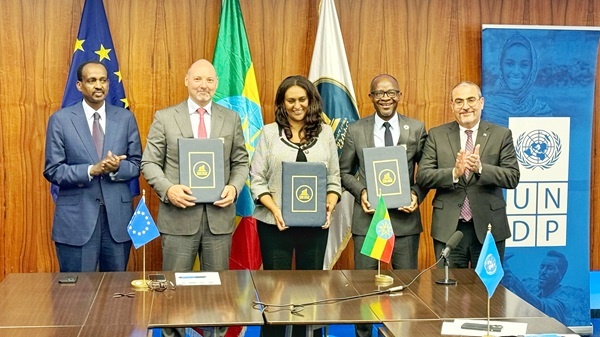
ADDIS ABABA (UNDP Ethiopia) – The European Union is committing to support the National Rehabilitation Commission’s work for a more prosperous and peaceful Ethiopia. The National Rehabilitation Commission (NRC) was established in November 2022 and is responsible for a DDR program that seeks to disarm, demobilize, and reintegrate an estimated 370,000 ex-combatants in eight regions of the country with the participation of relevant stakeholders.
The European Union will contribute 16 million Euro (about 1 billion ETB) to the UNDP-managed multi-partner program.
A signing ceremony took place at the Ministry of Finance on Thursday 29 February 2024 in the presence of State Minister Semerta Sewasew (Ministry of Finance), Ambassador Teshome Toga (Commissioner, NRC), H.E. Roland Kobia (Ambassador of the European Union to Ethiopia), Dr. Ramez Alakbarov (UN Resident and Humanitarian Coordinator for Ethiopia) and Mr. Samuel Doe (Resident Representative, UNDP-Ethiopia).
State Minister Semerta Sewasew said, “On behalf of the Federal Democratic Government of Ethiopia, the Ministry of Finance appreciates the European Union for supporting the Disarmament, Demobilization and Reintegration process in Ethiopia. The DDR requires a significant amount of resources. The government of Ethiopia has been supporting the NRC since its establishment for institutional set up and remains committed to cover 15% of the National Demobilization and Reintegration Program. I hope that EU’s contribution would invite other potential partners that are showing interests to support the National Rehabilitation Commission to discharge its mandates.”
“On behalf of the National Rehabilitation Commission and my own behalf, I would like to express our sincere gratitude to the EU for contributing to the basket fund for DDR,” NRC Commissioner Ambassador Teshome Toga said, noting further that, “This is one of the first such contributions and hope others will follow suit. DDR as one of the critical components of Pretoria Peace Accord and Declaration on the Modalities of Implementation of the Agreement, it needs the participation and contributions of all stakeholders, friends, and partners of Ethiopia for its effective and successful implementation.” Ambassador Teshome stressed that DDR is an integral part of the peacebuilding process.
Ambassador Roland Kobia said: “The EU support to DDR comes from our firm belief that Ethiopia possesses the capabilities and potential to find pathways for dialogue and consensus, and ultimately for peace and progress in all areas, politically, economically and socially. I would like to reiterate once again that this is your process, and it should be owned by the Ethiopian people. I have seen that Ethiopian women and men have an undisputed common denominator: resilience and courage, to face every day the economic hardship, conflicts and natural disasters. The growing social fragmentation and challenges facing Ethiopia at all levels strengthen the need for sustainable peace. A DDR process that is realistic, gender responsive and inclusive, transparent and effective, is a key step forward”.
UNDP is managing the DDR program as one of five windows within a wider Peace Support Program that has been rolled out in Afar, Amhara and Tigray regions with support from Germany, Japan and UNDP’s Funding Windows. The other windows are: Local governance, human rights, and social cohesion; Basic social services; Economic revival; and Solutions to internal displacement.
“UNDP’s experience in supporting DDR goes back to the early 1990s as we see it as a complex and nonetheless integral process to ensure that communities can rebuild and recover. We are bringing our experience on similar projects in Africa and other regions to convene partners to help Ethiopia implement a successful DDR program,” UNDP Resident Representative for Ethiopia, Mr. Samuel Doe noted, stressing that “We need to get the DDR process rolled out at speed and scale to ensure that Ethiopia delivers on the promise of peace for all its citizens”.
Source: UNDP Ethiopia
